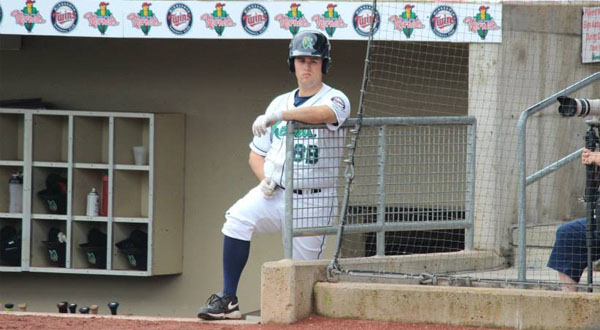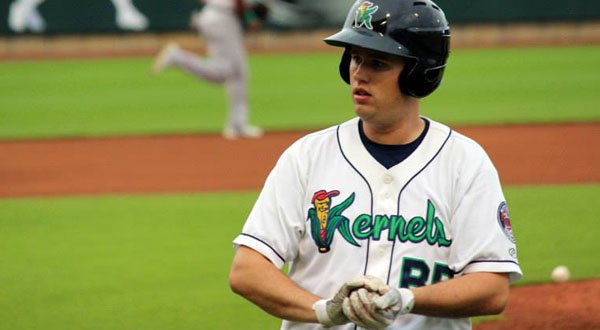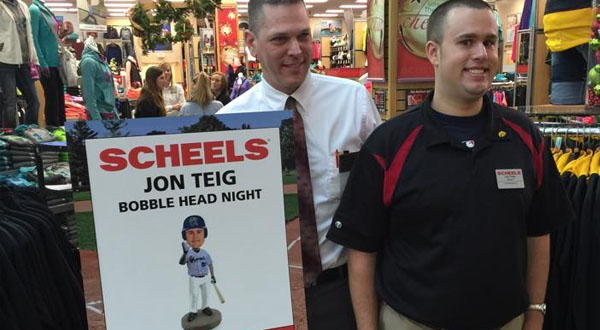What separates Jon Teig from the rest of us is this…he’s been the batboy for the Cedar Rapids Kernels since 2000 and, yeah, he’s autistic.
I had a chance to talk to Jon-Jon’s dad Bob, a retired assistant U.S. Attorney, and by the end of the conversation, I really got the sense that regardless of what his 28-year-old son does for work and regardless of his daily struggles, the younger Teig is just like you and me. He loves baseball and he’s not about to let anything get between him and his love and that is exactly why he was a no-brainer when it came to awarding him the Glenn Burke Memorial Courage Award.
HOVG: Let’s start at the beginning. It’s 2000, Jon is 13 and, for some reason, looking for work. How did he end up as the batboy for the Kernels?
TEIG: Jon was just shy of his 14th birthday when he became a full-fledged Kernels batboy in 2000. In 1999, Jon had been a guest batboy several times, and he was hooked.
Jon loves baseball. In grade school and middle school, he played in a recreational baseball program with friends, and he always looked forward to going to Kernels games.
One day in the Fall of 1999, I happened to see General Manager Jack Roeder as we were crossing the street in opposite directions. Jack knew us as regulars from Kernels games, and knew Jon specifically from the times he was on the field as a guest batboy.
I asked Jack if they were ever looking for new batboys, and he set up a job interview for Jon. Jack talked to Jon in the cramped office at the old ballpark and “hired” Jon on the spot for the next season.
I say “hired” because Jon was going to be five months short of being able to officially work. He didn’t get paid because of that, but got lots of stuff from the souvenir stand. That was fine with Jon because he would have paid them for the chance to be a batboy.
HOVG: I’ve got to think he was instantly embraced. As parents, much less as parents of an Autistic child, how did that acceptance make you feel?
TEIG: One time that first year, we heard the players were kidding around and taped Jon to a support beam in the clubhouse. Some might think they were being mean, but we knew ballplayers and how they like to mess with each other. We knew then Jon had been accepted as one of the guys. Not a kid who had trouble with his speech, but one of the guys!
The only time better than that was when Mike Napoli taped Jon to a chair and put a hotdog in front of him where he couldn’t get it. Jon was known for not being bashful when it came to food in the clubhouse.
Not only have the staff and players embraced Jon, but the fans have. It took a few years for word of Jon’s autism to reach them because, from the stands, you can’t tell. But they know Jon has made his mark on the game by things like doing the “Family Guy” “Peanut Butter Jelly Time” dance in the dugout for rally time; catching foul balls that go over the backstop screen and bounce off the press box back over the screen (I’ve never figured out how he knows where the ball will go and he’s there waiting for it); and being the first one – every time — to rush the field when the Kernels win.
The fans know this 28-year-old man as “Jon-Jon” the batboy.
To give you an example, a few games ago, Jon was going to give a baseball to a young fan a few rows up and who happened to have Down Syndrome. I asked the dad if it was okay, and, as I walked down the steps with his son, I pointed to my son and said “That’s Jon-Jon.” His response? “I know.”
And through all this, to Jon “It’s my job.” Nothing particularly special, just the way things are supposed to be for anyone. That’s all we have ever wanted for Jon, and at the ballpark he has it.
How many people honestly can say they have their dream job? The only one I know of stands on the top steps of the Kernel’s dugout for every game at Perfect Game Field.
HOVG: Ever have any “no…maybe this isn’t for us” moments?
TEIG: As a parent, yes; but Jon, never! Early on, there was a game when Jon ran out to grab a bat before the play was over. Turns out there wasn’t a problem, but it could have interfered with the game and Jon could have been hurt. We wondered if Jon would know when it was ok to go out on the field or pick up a ball that came towards the dugout.
But like everyone, he had to learn a new job, and he’s done it. When it’s game time he keeps his eye on the home-plate umpire for the signals about how many balls to take out. Ever notice that? He watches the field for signals that that umpire needs Gatorade. Ever notice that? He is always watching so he can take care of his responsibilities
During the game, Jon is all business and serious about what he does. There are many times I try to talk to him between at-bats, and he usually says “I have to work now.”
There was one visiting manager who didn’t understand Jon’s disability and demanded Jon not work in his dugout. Jon was upset, and thought he had done something really wrong when he was told he was not allowed on the visitor’s side. I asked to meet with the manager to find out why he had banned Jon from his dugout.
It turned out that, while Jon was working their side, if the Kernels had something good happen, Jon would smile. The manager thought Jon was mocking his team. After I explained Jon’s autism and why he would smile if his team did well, the manager backed off.
Without prompting, Jon apologized to the manager for anything that had upset him, but the manager never apologized to Jon for how he had made Jon feel. It was apparent who was the better man.
HOVG: I read that Jon gets paid $30 a game. Is that the going rate to be a batboy in the Midwest League or is Jon too proud to take a raise?
TEIG: We have no idea how much batboys get paid by other teams or even what the other Kernels’ batboys get paid. Jon isn’t too proud to take a raise; he just would never think to ask for or expect one.
He is proud of the fact he can earn money on his own, but that’s not why Jon has been with the Kernels for 15 years. Days when he’s not working his other job at Scheels, he’ll be at the ballpark six hours before the first pitch — helping out, catching fly balls during BP, and hanging out with the guys. Like I said before, if the Kernels only knew… Jon would pay them to be batboy!!
HOVG: For the longest time, the Kernels were the single-A affiliate for the Los Angeles Angels. After the 2012 season, the Minnesota Twins stepped in and took over. Was Jon keeping his job a no-brainer or was it something he had to apply for?
TEIG: Jon works for Cedar Rapids Ball Club, Inc., and not the Major League affiliate, so that transition was easy. We were concerned, though, about Jon’s allegiance. Jon is a faithful fan to his core, and his loyalty is unwavering.
At one point, he knew half the Angels’ on the Major League roster. And they knew him. For eight years when we went to Spring Training in Arizona, Minor League players would yell across the practice fields: “Jon-Jon.”
As fans stood in line futilely trying to get players to come over and give an autograph, they wondered “who is this guy who just stands there with a smile while Mike Trout, Peter Bourjos, Howie Kendrick, Mike Napoli, Mark Trumbo, Erick Aybar, and others walk over to him, give him a hug, and stop to talk?” That would be hard for anyone to let go of.
But the Spring Training after the Twins signed with the Kernels, Jon had a choice of going to Tempe or going to Ft. Myers. We didn’t go to Florida for the beach.
HOVG: Clearly the Kernels love Jon. They’ve dedicated a night each of the past few seasons to raising money for Autism Action by holding postgame jersey auctions and, on August 7, they’re actually holding “Jon Teig Bobblehead Night”. What was Jon’s response to getting his own bobblehead?
TEIG: Jon is excited to be having his own bobble head night. And he’s proud of his job and how he does it. More than once he has talked about August 7 saying, “I bet it will be sold out.” You should have seen Jon’s face when Scheels had a fake staff meeting to surprise him and unveil a picture of the bobble head mockup.
But to Jon, this isn’t something that goes to his head. As he’s often said, “It’s just baseball.”
HOVG: What was the response from the community?
TEIG: Even people who are not baseball fans have said they are going to the game. When Scheels was asked if they would sponsor the bobble head, they jumped at the chance. And they aren’t doing it for the advertising, “we’re doing this for Jon.”
HOVG: A couple years ago, you packed up the family and traveled to California to see the Angels up close and in action. Naturally, there were several former Kernels on hand and, of course, they were excited to see Jon. Tell me about that reunion and that makes you feel as a father?
TEIG: In September 2012, Jon walked on the field at Angels Stadium to watch BP. The first player to yell “Jon-Jon” and run over to give him a hug was Mike Trout.
And there were others: Hank Conger, Bobby Wilson, Erick Aybar, Alberto Callaspo, Howie Kendrick, Mark Trumbo . . . The Angels were playing the Rangers, and Mike Napoli came over and told us the tape and hotdog story. He also told us a story we hadn’t heard.
Jon had come home one night with his shoe laces cut off and we never knew exactly what had happened. It got cleared up when Mike volunteered the story about how the players had tied Jon’s and another batboy’s shoes together – while they were in them. The laces were tied so tight, they had to cut them apart. It says something that Nap would remember this after so many years.
HOVG: One of the guys most excited to see Jon was all-world outfielder, reigning American League MVP Mike Trout. What was their reunion like? And what does that say about Trout as a person?
TEIG: Again, Mike was the first player to run across the field and hug Jon. Jon was totally cool about it – “hey, he’s my friend.” Jon isn’t star struck by these baseball stars; he knew them when they weren’t. He isn’t interested in autographs. You don’t ask friends for autographs.
Mike and Jon were just happy to see each other. Mike asked Jon about back home in Cedar Rapids, and Jon complimented Mike on how many home runs he’d hit. Of course, Jon knew the number!
Jon sent his first bobble head to Mike, and a staff member took a picture of Mike opening it. You can see from Mike’s expression that it meant something to him.
These are things people don’t know about players. There are some players who are full of themselves, but it seems baseball is full of good folks. It says a lot about Mike and others that they not only remember a batboy from one of their many stops on the way to the big leagues, but they also have their faces light up when they see him.
HOVG: Conversely, Jon was asked to meet future Hall of Famer Albert Pujols, but refused. Why?
TEIG: Funny story. We’re just glad Jon was polite about it. Like I said, Jon isn’t in awe of the stars. While we were on the field for BP in 2012, Albert Pujols was about six feet away from us. We were talking to Mike Scioscia, and an Angels staffer asked Jon if he wanted to meet Pujols. Jon said, “No, thanks. He’s not a Kernel.” ‘Nuff said.
HOVG: In your estimation, who has meant more to who…Jon for the Kernels or vice versa?
TEIG: They perfectly complement each other. Jon has been so fortunate in his life. Don’t think it has been easy. There have been lots of really bad experiences – one from a school administrator who chose athletes over acceptance. But there always has seemed to be a guardian angel along the way to help Jon make the most of every opportunity he has had. Peers, teachers, school staff, friends, neighbors, the Kernels, Scheels, and especially Jon’s brother Alex . . . they all have had a huge part in helping Jon grow into the person he is today.
Probably the most noticeable impact of Jon’s autism is on his speech. Complete sentences are rare. Several years ago, I was helping take things into the clubhouse after the Kernels had lost. Jon tried to get the players’ attention because he wanted to say something.
Players shushed each other, and Jon gave them a pep talk. A pep talk!! It was halting and maybe less than eloquent, but they listened and heard him. To me, it was the Gipper speech. I never would have heard that if Jon hadn’t had the support and kindness of so many over the years.
As far as Jon’s impact on others, I can’t say. You’d have to ask them. But there’s one more story I can tell.
Earlier this season, the Kernels had one of their charity fundraising silent auctions of game-worn jerseys. I was bidding on Jon’s BB jersey, and a young woman was bidding me up to a price higher than for many of the players’ jerseys. She finally asked who I was, and I told her I was Jon-Jon’s dad and I was bidding for him. She kindly moved her attention to another jersey, but not before she told me why she was bidding on Jon’s.
She comes to a lot of Kernels games, had watched Jon, and knew about Jon’s autism. She has a brother in his 20s who has autism, and she thought it would be good for him if she could tell him about Jon and give him Jon’s jersey.
HOVG: Lastly, it was last year’s Glenn Burke Memorial Courage Award winner, former Kernels infielder Tanner Vavra who put his support behind Jon for this year. What does that say about Tanner and what does Jon being recognized mean to Jon and to you?
TEIG: Tanner is one of those players you really root for to succeed, whether it’s in baseball (hopefully) or something else he loves. He is genuine, kind, and caring; just the kind of person you want your son to have for a friend.
When you told me this, it didn’t surprise me that it came from Tanner. However, I gained a new level of admiration for him knowing that he would think of Jon this way.
As far as my reaction, I think it is VERY cool. When people interact with Jon, it’s not because they feel sorry for him. When they get to know him they discover he’s, in the words of Pinocchio, “a real boy.” That’s all I’ve ever wanted people to realize.
As far as Jon’s reaction, that’s kind of a different story. It made him smile and ask questions when I explained the Hall of Very Good, and he was pleased about it. But as with the bobble head, it’s something he sees as just being a part of life. It doesn’t stoke an ego or change who he is. It’s just part of the natural order of things, or, as Jon says, “it’s just baseball.”
Thank you for recognizing that and Jon.
*****
The Hall of Very Good™ Class of 2015 is presented by Out of the Park Developments, the creators of the wildly popular baseball simulation game Out of the Park Baseball. Out of the Park Developments has made a generous donation to The Hall.
Add The Sports Daily to your Google News Feed!


